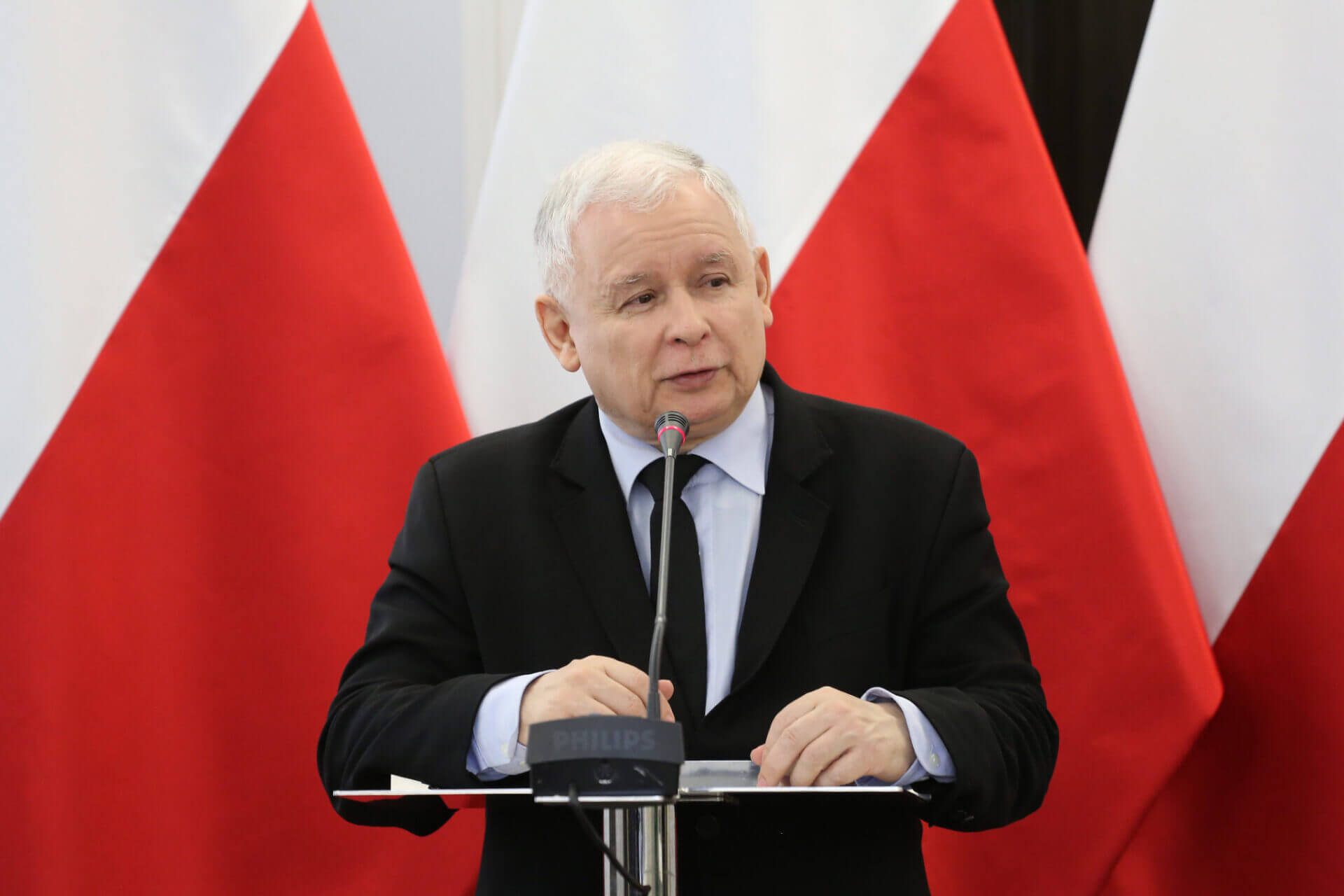Poland has warned the European Union (EU) to release $35 billion in pandemic funds that have been frozen over the rule of law controversy, failing which it would “have no choice but to pull out all the weapons” in its “arsenal” and “open fire.”
In an interview with the Sieci magazine, Law and Justice (PiS) chief Jarosław Kaczyński toughened his stand on the dispute, noting that Poland had shown “maximum goodwill” and “made big compromises.”
However, he said, “Since the European Commission (EC) does not fulfil its obligations towards Poland in this area, we have no reason to fulfil our obligations towards the European Union.”
To this end, he said that if the EC “tried to push us against the wall we will have no choice but to pull out all the weapons in our arsenal” and respond with “an eye for an eye.”
Nobody in Europe want to enslave the proud Polish people… or it has to be Kaczyński himself by constantly undermining the rule of law and the democratic principles in Poland… copying Putin’s Russia ! https://t.co/bo4MQgCj1F
— Guy Verhofstadt (@guyverhofstadt) August 8, 2022
On the same note, speaking to a Polish state-owned radio station, PiS secretary-general Krzysztof Sobolewski warned that Warsaw would initiate legal proceedings against the EU and block any proposals it makes, including new laws and initiatives. Moreover, he said he would gather support and form an alliance to oust EC President Ursula von der Leyen. He clarified, however, that the party does not want to leave the EU but merely reform it into a “union of European nations.”
In the Sieci magazine interview, Kaczyński clarified that if Poland wins the conflict with the bloc, the EU would have to recognise the treaties and agreements that guide their relations. For instance, the European Court of Justice has said the power to appoint judges rests with the head of the state. In this regard, he dismissed EC President Ursula von der Leyen’s call for a reversal of reforms introduced by the government, as it would cause “total chaos in the Polish state.”
He also said that Poland’s opposition parties are colluding with the EU’s plan and are “cynically [counting] on fortunes that they will earn by enslaving Poland.” Kaczyński remarked that the bloc is “trying to take [Polish] freedom [and] sovereignty.”
The chief justice of Poland's Supreme Court has called on the EU to stop "bullying" Poland with demands for further changes to its judicial system.
— Notes from Poland 🇵🇱 (@notesfrompoland) August 9, 2022
"I get the impression that this is not about the rule of law," she said https://t.co/nXt7zRwZot
Speaking of the way ahead, Kaczyński reiterated that the government’s priority is to “take care of all Polish citizens [and] take measures that will reduce the cost of energy.” When asked about the possibility of the EU issuing penalties and blocking relief and other funds, he asserted that had he believed that the bloc would release the COVID-19 relief funds, he would have “taken a different approach.”
Kaczyński argued that Poland’s refusal to adhere to the EU-Germany plan meant the bloc would continue blocking funds. He said, “We do not fit into German-Russian plans to rule Europe,” adding, “An independent, economically, socially, and militarily strong Poland is an obstacle for them.”
Opposition leaders criticised Kaczyński’s comments, raising concern that it could lead citizens to support an exit from the EU. Civic Platform party leader Grzegorz Schetyn asserted that Kaczyński was using the EU as a “scare tactic” but said his attempts would fail, claiming, “No one will take seriously a man who, instead of big funds, prefers to give Poles poverty, lawlessness, destruction of judicial independence and, consequently, #Polexit.”
Im bardziej Kaczyński straszy UE, tym bardziej popada w śmieszność. Nikt nie będzie poważnie traktować człowieka, który zamiast wielkich funduszy woli dać Polakom biedę, bezprawie, niszczenie niezależności sędziowskiej i w konsekwencji - #Polexit. Symbol szaleństwa i upadku.
— Grzegorz Schetyna (@SchetynadlaPO) August 8, 2022
For months now, Poland has been at loggerheads with the EU over the bloc’s refusal to release pandemic relief funds over its failure to meet its rule of law “milestones.”
At the centre of the EU’s concerns lie drastic judicial changes that have been criticised for stifling the independence of the courts. The judicial system has been overhauled to allow the government to dismiss judges opposing the reforms, lowered the retirement age of Supreme Court judges, and established a chamber to discipline judges. However, Poland maintains that the reforms were necessary to streamline the judiciary.
As a result, the EC initiated infringement proceedings against the Polish government, as its reformed judicial system does not protect judges from political control as mandated by the Treaty of the European Union. Last month, the EC released its third rule of law report, highlighting “serious concerns” about the independence of Polish judges.
This week, the #vdLCommission meets to discuss:
— European Commission 🇪🇺 (@EU_Commission) July 13, 2022
🔹 2022 Rule of Law Report
➡️ State of play in the EU
➡️ Situation by country
➡️ Recommendations to EU countries pic.twitter.com/MaCCXap1Md
Similarly, in December last year, Brussels initiated legal proceedings against Poland after a Polish constitutional tribunal ruled in October that some parts of EU law are incompatible with the Polish constitution, thereby establishing the importance of local laws over EU law.
Thereafter, the EU imposed a fine of €1 million ($1 million) per day for not complying with the ECJ’s decision, which now stands at €280 million ($280 million). In November, the Commission activated the conditionality mechanism, linking compliance to the rule of law with receiving payments from the EU budget.
Poland is in dire need of access to EU funds, considering the country’s surging inflation (particularly energy and food) and the looming threat of an economic crisis.

